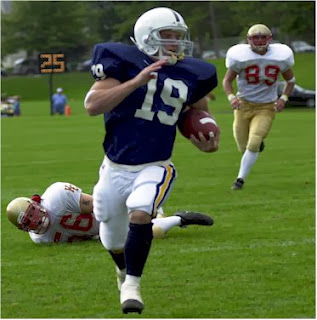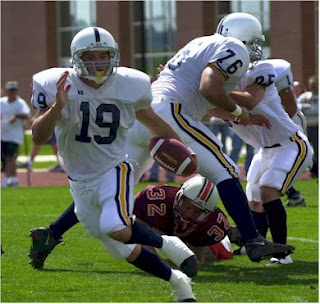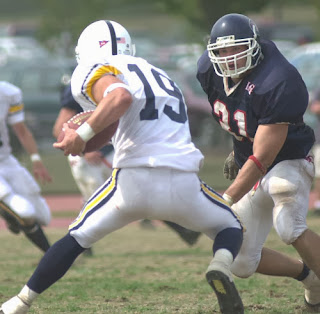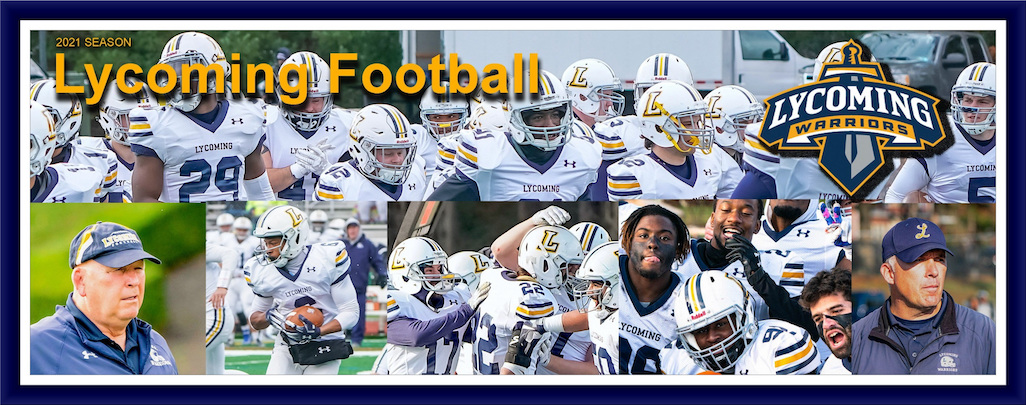 |
| Two greats passed away in this photo: #19 Ricky Lannetti and Tom Aubry, in the denim jacket on the far right. |
By MARK KRAM
Daily News Staff Writer
Clouds of snow whipped across his windshield. In clear weather the drive to Williamsport, Pa., always took Rick Lannetti 3 hours or so, but he gave himself some extra time that cold December day, leaving his Yardley home in the emerging dawn. The turnpike had become an ever-narrowing lane of slush, the visibility poor and getting worse. But kickoff was not until 1 o'clock that Saturday, so he took it easy on the gas and even stopped for a cup of coffee. He planned to check in to his room, get a nap and then go to the field early to see his only son, Ricky, the Lycoming College wide receiver and kick returner, who that day would be playing an NCAA Division III quarterfinal against Bridgewater (Va.). "It was the biggest game of his life," Lannetti would say later.
By 9:30 a.m., he was just outside of Williamsport when he received a call on his cell phone.
The voice on the other end belonged to his former wife, Terri.
"Check into your hotel and come to the hospital," she said with a pointed urgency. "Ricky is really sick."
 |
| Ricky Lannetti |
 |
| Ricky Lannetti |
Lannetti remembers a doctor gravely advising him, "Something is attacking his body..."
 |
| Ricky Lannetti |
Kiessling adds, "The issue is how it got into his system, whether it was from a puncture in his foot or a sore on his buttock or - and this what it sounds like - whether it was growing in his lungs."
 |
| Ricky Lannetti |
 |
| Ricky Lannetti |
 |
| Ricky Lannetti |
 |
| Ricky Lannetti |
 |
| Ricky Lannetti |
 |
| Ricky Lannetti |
 |
| Ricky Lannetti' Jersey |
Terri Lannetti had driven up to Williamsport the evening before to beat the snow. With her was Bill Koch, a longtime coach at Father Judge and a friend of the family. The two had spoken to her son off and on through the week and knew he had come down with something. She planned to get him a hotel room that Friday, just to get him out of the dorm so he could get some undisturbed sleep, but her son called her on her cell phone at 9:30. He told her he was exhausted and going to go to sleep, that he would see her the following morning. So she checked into her room at 1 a.m., only to be awakened 3 hours later by the telephone.
It was her son.
He sounded short of breath, weak.
"Mom," he said, "can you come and get me?"
Knowing the younger Lannetti the way Koch and others knew him, it was understandable that he would have downplayed his sickness for as long as he possibly could. "He worked his ass off to play," says Koch, who says Lannetti scored touchdowns at Father Judge in every conceivable manner: rushing, receiving, fumble return, interception return, kickoff return and punt return. No one else at the school had ever done that. When he moved on to Lycoming, he set school records for catches in a game (16) and in a season (70). At 5-10 and 185 pounds, he earned All-Middle Atlantic Conference honors as a receiver (first team) and returner (second team). He had five catches in the playoff game the previous weekend against East Texas Baptist, and looked forward to the quarterfinal game against Bridgewater that Saturday with the same stubborn earnestness that underscored whatever he did on the football field. Says Koch with a grim chuckle, "When it came to playing with pain, Ricky could be kind of a knucklehead."
The first faint stirrings that something was wrong began on Monday. Koch remembers speaking to him that day, and Lannetti told him was not feeling well; he had a cough and runny nose. On Tuesday, tight end Sean Hennigar says Lannetti practiced with the team but became woozy and sat out the final few plays. He began vomiting on Wednesday and saw the school nurse the following day. He received something to settle his stomach. Terri says she then called the head athletic trainer, Frank Neu, who arranged to have him seen by a local physician on Friday. Lannetti had some blood work done and it was initially conjectured that he could have hepatitis. Neu arranged for Lannetti to meet with the team physician at 9 a.m. Saturday. When he spoke to Lannetti on Friday evening, Neu says that Ricky told him he was "feeling a little better." Says Neu, "That was when he took a turn for the worse."
That Friday night was simply dreadful. In the dorm room he shared with Hennigar and linebacker Brian Connors, Lannetti was unable to get any sleep whatsoever. He was up and down, feverish. He would stretch out on his bed, then get up again and sit in the chair. Hennigar and Connors offered to take him to the hospital, but Lannetti said no; he had that appointment with the team physician later that morning and still believed he had an outside chance of playing. Only when it became clear that his moaning was keeping both Hennigar and Connors from getting any sleep did he summon his mother, who found him in such declining state that he could barely walk. Hennigar and Connors had to help him to the car. Seeing him in this condition was particularly upsetting to Hennigar, whose brother Greg had just completed his freshman year as a walk-on at Penn State when he died last May in an automobile accident. Says Hennigar, "All I ever had to do was say the word, and Ricky was there for me."
His mother drove Lannetti back to her hotel. "He laid down on the bed and then said, 'Help me up,' " she says. "And I would help him up, and then he would lay back down again. At one point, he said, 'Just lay here with me.' "
Koch called an assistant coach. "We knew we had to do something," he says. "So I called the assistant coach and he called the trainer, who met us at the football complex. Once he got there, he took a look at Ricky and led us to the hospital."
What happened then passed by in a blur. When Lannetti vomited blood on the floor of the emergency room, his mother remembers someone shouted, "You have to take him now!" She remembers feeling his hands and feet; they were cold, clammy. "He was having trouble breathing," she says. "And saying over and over again, 'I am so tired...so tired.' " When they hooked him up to a catheter, the bag filled with what Koch remembers as "this brown mass." Doctors only then learned from him that he had not urinated in 2 days; his kidneys were shutting down. His mother held off calling his father, who she knew was on his way to Williamsport, so he would not "go crazy and have an accident getting here." When he arrived at the hospital at 10:30 a.m., he found his son in ICU with a team of specialists attending to him. With his blood pressure and pulse precariously low, they hooked him up for an EKG, which revealed that his heart was failing. The doctors told Rick and Terri that "we have no idea what we are dealing with, if it is viral or bacterial," but just hoped to stabilize him enough to fly him into Temple. He slipped into unconsciousness at 5:36 p.m. and was declared brain-dead.
Rick sighs as he remembers hearing that. "It was just like it was a dream," he says. "I was waiting for someone to tell me what to do. You are...well...I had gone up there that day to see a football game and this happened."
Terri invited the players to his bedside to say their final goodbyes. "Ricky had a half-smile on his face - this smirk," she says, "as if he had just done something and gotten away with it."
Lycoming and Bridgewater played the following day. Rick, up the whole night, was driven home, finally falling asleep in the back seat. Terri decided to go to the game, if only to show her support for the grief-stricken team. Hennigar scored a touchdown, but remembers the hollow feeling as he crossed the goal line. Bridgewater ended up winning, 13-9. Wherever Terri seemed to look that day, she was reminded of Ricky. Someone had written his No. 19 in the snow and his teammates had draped his jersey over their bench. "You know, it was a weird feeling," she says. "It was sort of like he was still there."
They buried Ricky Lannetti a few days later at Resurrection Cemetery, in Bensalem. In the cold days that followed, his parents have tried to piece their lives back together and come to some understanding how this could have happened. Both have been off from work since Ricky died - his mother as a Philadelphia police officer, his father as a computer analyst at Verizon. He says he spends hours upon hours each day at the computer looking up other cases where staphylococcus has ended in fatality, but so far has found that it tends to afflict the very young or the very old, not someone as healthy and as athletic as his son. Young death is so utterly preemptive.
His former wife has her ups and downs. "Some days I feel fine, other days not so fine," she says, her eyes welling with tears. "I think about him all day. I wake up thinking about him; I go to bed thinking about him. I still have trouble believing this actually happened. I know he is in a better place."
Rick sighs. "I just want to die," says Lannetti, who had two younger daughters with his ex-wife. "If God had told me 46 years ago that He would take my only son - 21 years old - I would have told God: 'Please, I do not want to go on.' I have no desire to keep on living, but I know my daughters need me, so I try to keep it together."
The hard part is coming to terms with what could have been. Ricky Lannetti would have graduated with a degree in criminal justice and had plans of getting into law enforcement, possibly as a parole officer. He also had a cousin who is in the Secret Service, so looking into that also held some appeal. Rick adds that it would not have been beyond his son to take a shot at pro football, if not with an NFL team then in Europe or with an Arena League organization. "This kid just loved his football," says Lannetti, who began filming the games his son played when he was 5 years old. He says he now has more than 100 videotapes piled up in his house, but doubts he will ever watch them again. With voice cracking, he says, "Doing that would be just too sad."
Certain days he goes to the cemetery just to think. The graves of Ricky Lannetti and Greg Hennigar face each other, and Rick has had the idea of connecting them with chalk lines: Lannetti the wide receiver, Hennigar the quarterback. He thinks of them there together and feels better somehow. He imagines them playing catch together as they used to as boys at Father Judge, forever young and running pass patterns by the light of the moon.
